Drug Rehab & Alcohol Rehab in Gloucestershire & Near Gloucestershire
Quick links for drug and alcohol rehab in Gloucestershire and near Gloucestershire
- Choosing Between Private & Council-Funded Drug Rehab & Alcohol Rehab In Gloucestershire
- Is Residential Drug Rehab & Alcohol Rehab In Gloucestershire Suitable For Me?
- What Are The Alternatives To Drug Rehab & Alcohol Rehab In Gloucestershire?
- Understanding The Admission Process For Drug Rehab & Alcohol Rehab In Gloucestershire
- Holding An Intervention In Preparation For Drug Rehab & Alcohol Rehab In Gloucestershire
- How Much Does Drug Rehab & Alcohol Rehab Cost In Gloucestershire?
- Creating A Relapse Prevention Plan At Drug Rehab & Alcohol Rehab In Gloucestershire
- What Types of Therapy Can I Access During Drug Rehab & Alcohol Rehab In Gloucestershire?
- What Are The Alternatives To Drug Rehab & Alcohol Rehab In Gloucestershire Or Near Gloucestershire?
- Charities & Statutory-Funded Drug Rehab & Alcohol Rehab Services In Gloucestershire
Substance abuse problems [1] can lead to a great deal of misery. The real problem is that most people do not even realise how damaging alcohol or drugs are in their lives or that they need drug and alcohol rehab in Gloucestershire.
The realisation can occur because the person hits rock bottom and becomes sick and tired of feeling sick and tired, or they may be helped to understand their situation by attending drug or alcohol counselling sessions, which may lead to wanting to attend drug and alcohol rehab in Gloucestershire.
Once the person does become ready to go to drug and alcohol rehab in Gloucestershire, they will be in a position to escape their misery [4] and build the type of life that they really deserve.
We offer access to a selection of drug and alcohol rehab services in Gloucestershire and near Gloucestershire, including:
- Outpatient drug and alcohol rehab in Gloucestershire & near Gloucestershire
- Intensive outpatient drug and alcohol rehab in Gloucestershire & near Gloucestershire
- Inpatient drug and alcohol rehab in Gloucestershire & near Gloucestershire
- Intensive inpatient drug and alcohol rehab in Gloucestershire & near Gloucestershire (partial hospitalisation)
To learn more about undergoing drug and alcohol rehab Gloucestershire, call our helpful team today on 0800 088 66 86
Receiving A Dual Diagnosis At Drug & Alcohol Rehab Gloucestershire Or Near Gloucestershire

Therapy group talking at a drug and alcohol rehab clinic in Gloucestershire
Getting help and support at drug and alcohol rehab in Gloucestershire when you are struggling with a substance use disorder can often be difficult enough.
However, many people are also living with an untreated mental health condition that is only diagnosed when they arrive at a drug and alcohol rehab clinic in Gloucestershire.
This is known as a dual diagnosis at drug and alcohol rehab in Gloucestershire, and it can make managing and recovering from one or both of these conditions much more difficult. [11]
Your addiction and your mental health disorder [12] will each have symptoms that can make it hard to function in daily life. Additionally, both conditions may interact with and affect each other, but these can be treated at drug and alcohol rehab in Gloucestershire.
There are certain mental health conditions that commonly exist alongside substance use disorders and are found at drug and alcohol rehab in Gloucestershire. [13]
These include:
- Bipolar disorder
- Borderline personality disorder (BPD) and antisocial personality disorder [14]
- Depression
- Generalised anxiety disorder (GAD)
- Schizophrenia
- Post-traumatic stress disorder (PTSD)
- Obsessive-compulsive disorder (OCD)
- Attention-deficit hyperactivity disorder (ADHD)
- Eating disorders such as anorexia and bulimia
It can often be difficult to spot an underlying mental health condition, and your medical team may not be able to diagnose you at drug and alcohol rehab straight away.
They may ask you several questions at drug and alcohol rehab in Gloucestershire about your family history, the way you use certain substances and your observations about your mental health.
Once diagnosed, you will benefit from evidence-based drug and alcohol rehab treatments such as counselling, medication and family support.
Receiving a dual diagnosis at drug and alcohol rehab can change your life for the better in many ways, as you will be able to receive the right help and support for both your substance use disorder and your mental health condition.
To find out how Gloucestershire drug and alcohol rehabs can support your mental health needs during treatment, call us on 0800 088 66 86
Why Is Abstinence At Drug & Alcohol Rehab In Gloucestershire The Most Effective Method For Addiction Recovery?

Garden at a drug and alcohol rehab clinic in Gloucestershire
Once you have completed your addiction rehab treatment in Gloucestershire,[15] you will likely be faced with a common dilemma.
Should you focus on complete abstinence for the rest of your life, never touching alcohol and drugs again after drug and alcohol rehab? Or could you learn to moderate your use of substances [16], stick to your limits and allow yourself to indulge every so often?
According to research [17], abstinence is the simplest and most effective way to achieve long-term rehab recovery from a substance use disorder. Experts have agreed [18] that abstinence is always the safer and more effective route to addiction recovery.
One slip could lead to another, and before you know it you may be headed towards a relapse and back into drug and alcohol rehab in Gloucestershire.
Addiction cannot be cured, [19] so management of it must be thorough and effective.
Committing to abstinence can also make it much easier to recognise the signs that you are headed for a relapse and are in need of drug and alcohol rehab again, as even one glass of wine is a red flag.
Deciding to simply abstain from all addictive substances helps you to move away from temptation and stay focused on your long-term drug and alcohol rehab sobriety goals.
To learn more about using abstinence in addiction rehab treatment in Gloucestershire or near Gloucestershire, call our team today on 0800 088 66 86
Choosing Between Private & Council-Funded Drug & Alcohol Rehab Gloucestershire & Near Gloucestershire
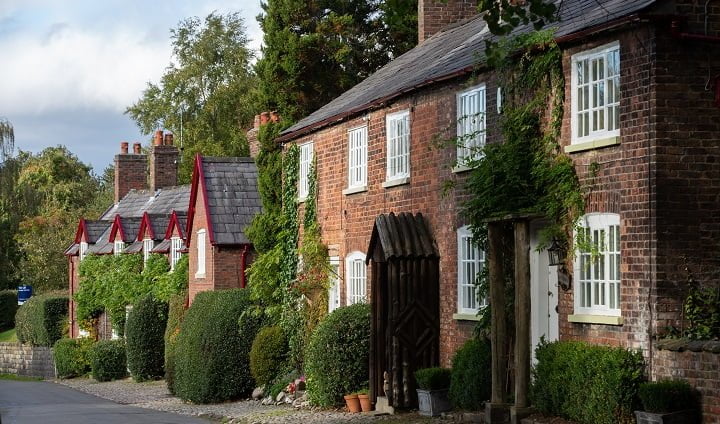
Outdoors a drug and alcohol rehab centre in Gloucestershire
Professionally supported drug and alcohol rehab in Gloucestershire[20] is one of the best ways to recover from addiction.
While both private and council-funded drug and alcohol rehab clinics in Gloucestershire provide a high standard of care, it can be helpful to be aware of the differences between the two in order to choose the option that best suits you.
It is usually recommended that you opt for private drug and alcohol rehab if you require immediate treatment. Many private rehab clinics in Gloucestershire can admit patients just a few days after initial contact, as long as they meet the criteria.
As their services are so in-demand, council-funded rehabs often have long waiting lists [21]with many patients waiting weeks or even months for treatment.
This can cause additional problems as addiction is a progressive disease that often becomes worse when left unmanaged, and the majority of people would benefit from fast and immediate drug and alcohol rehab treatment in Gloucestershire.
Private rehab clinics in Gloucestershire may offer a larger range of therapy treatments, so patients who are interested in a specific type of therapy should keep this in mind.
It is recommended that you thoroughly research your chosen drug and alcohol rehab clinic, whether private or council-funded, to ensure that they can accommodate your therapy needs.
By contrast, council-funded drug and alcohol rehab services in Gloucestershire. may not have the resources to offer specific therapy treatments such as equine or music therapy.
The most well-known disadvantage of private rehab in Gloucestershire is the cost, with many clinics charging thousands of pounds for a short stay.
However, the majority of private rehab clinics in Gloucestershire offer customisable treatment programmes with patients able to reduce the cost depending on the length of their stay and the type of amenities that they select.
Council-funded rehab services are often completely free or offer their services at a reduced cost [22], which can make therapy more accessible and affordable for many people.
Finally, patients who opt for private drug and alcohol rehab in Gloucestershire will benefit from a twelve-month intensive drug and alcohol rehab aftercare programme which includes ongoing counselling, acceptance into the clinic’s alumni programme and an extensive relapse prevention plan.
Each individual has their own needs, lifestyle and budget which would be best suited for either private or council-funded rehab. If you’re unsure, give our team a call today and we will be happy to walk you through your options in more detail.
For more guidance choosing between public and private drug and alcohol rehab Gloucestershire, call our team on 0800 088 66 86
Is Residential Drug & Alcohol Rehab In Gloucestershire Or Near Gloucestershire Suitable For Me?

Therapist with patients in group therapy at a drug and alcohol rehab centre in Gloucestershire
Whilst residential drug and alcohol rehab in Gloucestershire is an effective treatment method for anyone struggling with a substance use disorder, many people have the option to recover via an outpatient programme or home detox as long as they meet the specific criteria.
These criteria for detox at home instead of in-person drug and alcohol rehab exist because withdrawing from drugs and alcohol can be a dangerous process, both for the affected person and those around them.
These risks are mitigated in a professional setting, as residential rehab clinics in Gloucestershire offer 24/7 medical monitoring and can prescribe medication if necessary.
As a result, some people may find that an inpatient programme at a drug and alcohol rehab clinic is the safest form of addiction treatment in Gloucestershire for them.
If you meet one or more of the criteria below, your recovery will likely be safer and more effective at a residential drug and alcohol rehab clinic in Gloucestershire.
- I regularly drink more than 30 units of alcohol every day
- I have been diagnosed with Wernicke’s encephalopathy
- I have been aggressive and violent to others while attempting to withdraw in the past
- I have been unable to remain sober during drug or alcohol rehab treatment in the past
- I have experienced severe withdrawal symptoms in the past
- I have been diagnosed with a severe substance use disorder
- I have experienced suicidal thoughts and/or self-harm urges while attempting to recover in the past
- I have been diagnosed with a mental health condition which could make it difficult for me to recover
While residential drug and alcohol rehab is a great option for people with severe substance use disorders, this option is also available for people with mild to moderate addictions who wish to complete an inpatient programme.
For more advice and guidance in choosing the right addiction rehab treatment in Gloucestershire for you, call us on 0800 088 66 86
Understanding The Drug & Alcohol Rehab Admissions Process In Gloucestershire & Near Gloucestershire
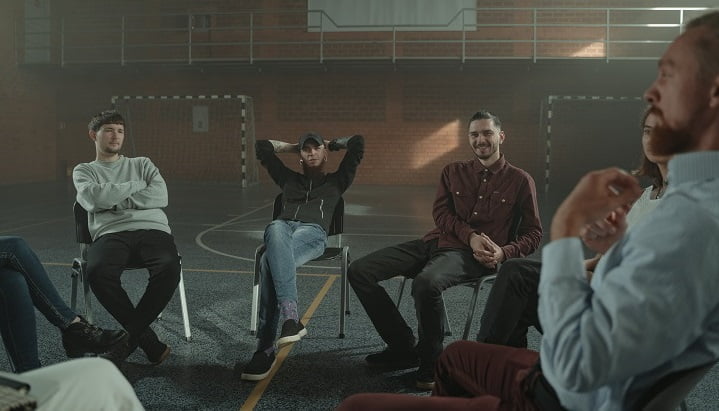
Therapy group together at a drug and alcohol rehab in Gloucestershire
Many of our team members have been in your position before, as the majority of us have experienced addiction or rehab in some form.
As a result, we are best placed to inform you about the drug and alcohol rehab admissions process in Gloucestershire and give you a better idea of what to expect.
Once you arrive at the rehab facility you will be introduced to your medical team and will then undergo a series of assessments.
The results of these assessments will form an objective view of your condition and allow your medical team to create an effective drug and alcohol rehab treatment programme that best suits your needs. This will include physical assessments such as blood tests and general health checks as well as several psychological assessments.
During the initial admissions process for drug and alcohol rehab in Gloucestershire, you may encounter the ASAM criteria, the DSM-5 criteria for substance use disorders and the AUDIT or CAGE Questionaire. They are designed to understand more about your addiction.
To learn more about diagnosing addiction in preparation for rehab in Gloucestershire, call our team on 0800 088 66 86
Holding An Intervention For Drug & Alcohol Rehab In Gloucestershire & Near Gloucestershire
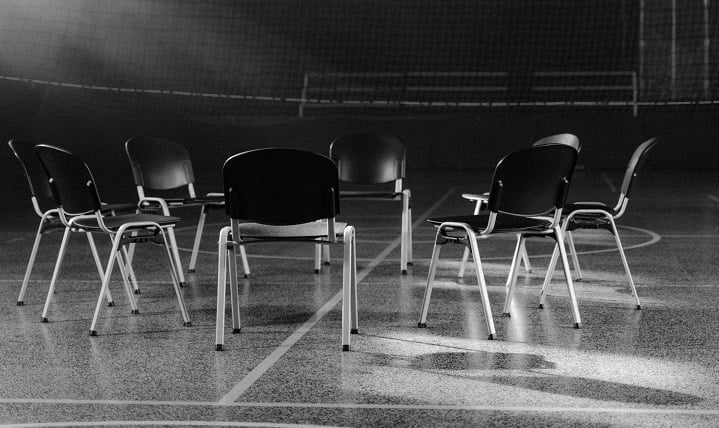
Black and white chairs for group therapy at a drug and alcohol rehab clinic in Gloucestershire
Watching addiction destroy someone’s life can be devastating, particularly when they are a close friend or family member. It can be even more frustrating when they repeatedly deny that they have a problem and refuse to seek drug and alcohol rehab treatment.
In these cases, professional intervention may be an effective method to push them towards full drug or alcohol rehab recovery.
It is always recommended to seek the services of a professional interventionist, who will be able to lead the meeting and ensure that the right message about their addiction and possible drug and alcohol rehab options is conveyed.
Each member of the group will request that the affected person seek rehab help for their addiction, with consequences such as loss of access to children or a relationship breakdown if they fail to do this.
While many interventions are successful, with the individual moving forward with drug and alcohol rehab treatment, some people find this type of confrontation overwhelming and even aggressive.
Thankfully, the CRAFT approach to intervention is another effective option for encouraging drug and alcohol rehab help. Community Reinforcement And Family Trading (CRAFT) [36] focuses on the family instead of the affected individual.
CRAFT encourages family members to praise and reward the affected person when they display positive behaviours, such as successfully overcoming a craving. This gentle approach may be more time-consuming, but it has shown enormous success at helping family members better cope with the stresses of addiction and showing the affected person that they need drug and alcohol rehab help and support.
For more guidance about hosting an intervention to help a loved one seek addiction rehab treatment in Gloucestershire, call our team on 0800 088 66 86
How Much Does Drug & Alcohol Rehab Cost In Gloucestershire & Near Gloucestershire?

Couple walking in the countryside after alcohol rehab in Gloucestershire
If you have completely dismissed the idea of drug and alcohol rehab in Gloucestershire due to the potential costs, it might be worth looking into your options before making a decision.
Although residential drug and alcohol rehab in Gloucestershire can be expensive, many clinics offer flexible plans that can be customised to suit your budget.
The cost of your rehab stay depends on several factors including the type of facility you select, the length of your treatment plan and any additional amenities such as a private room or spa facilities.
As a result, it is possible to find an affordable residential drug and alcohol rehab clinic and treatment programme.
If you wish to simply undergo a detox, you can attend drug and alcohol rehab on a 10-day plan for between £2,000 to £4,000 depending on whether you choose a shared or private room.
The most common length of time to attend drug and alcohol rehab is 28 days, and this will cost between £8,000 to £12,000 for a private room or approximately £6,000 if you opt for shared accommodation.
The cheapest option is a home detox which costs around £1,500, but it is important to remember that you will need to meet specific criteria to be approved for this type of rehab treatment.
Undergoing detox at home without the benefit of 24/7 medical monitoring at drug and alcohol rehab can be potentially dangerous, particularly for people with severe substance use disorders.
Additionally, a home detox only treats the physical aspects of the addiction. It is important to treat the psychological factors with intensive counselling at drug and alcohol rehab in Gloucestershire, which is not included in a home detox.
Your health is the most important investment that you will ever make, and with the option to customise your treatment plan and overall costs, there is no reason to dismiss the idea of attending residential drug and alcohol rehab in Gloucestershire.
For a more accurate estimation of how much your stay at a drug and alcohol rehab in Gloucestershire will cost, call us on 0800 088 66 86
How To Choose The Right Drug & Alcohol Rehab In Gloucestershire & Near Gloucestershire

Kitchen at a residential drug and alcohol rehab in Gloucestershire
Gloucestershire is home to a large number of drug and alcohol rehabs, and this large selection of choices can mean that it is difficult to decide on the right clinic for you.
Here at Rehab Recovery, we have years of experience with drug and alcohol rehab and addiction treatment so we know exactly what to look for when selecting a clinic.
While newly-established companies can certainly be effective, when it comes to your health and recovery it is recommended that you select a rehab clinic with a long track record of success.
A drug and alcohol rehab facility that has been running for twenty years is likely to be successful and effective at what they do, and staff members may have many years of experience working at that specific clinic.
The reviews that you read on the website of your particular drug and alcohol rehab may be glowing, but keep in mind that they will likely only be including the most positive comments.
As a result, it can be extremely helpful to read online reviews of the drug and alcohol rehabs Gloucestershire to ensure that they have a history of satisfied clients.
Make sure to check for the most recent reviews, particularly if the clinic has changed management over the last few years. This will give you the most accurate, well-rounded and up-to-date view of the rehab company and their policies.
These days, it’s crucial that your chosen drug or alcohol rehab has a safe and effective plan for any future Covid outbreaks.
Don’t be afraid to ask questions – will they continue inpatient drug and alcohol rehab treatment if there is a lockdown, or will all programmes be moved online? What are their mask and vaccine policies? Will they offer refunds if they are not able to provide effective treatment during a lockdown?
Arming yourself with the facts will ensure that you are as safe and protected as possible when it comes to Covid and your drug and alcohol rehab treatment.
While it’s true that you often get what you pay for at a drug and alcohol rehab, it’s important to ensure that your treatment programme and any other costs work with your budget.
You don’t want to spend your stay worrying about your finances or leave the rehab clinic with a mountain of debt that you will struggle to pay off.
Many drug and alcohol rehab clinics offer flexible programmes or payment plans, so make sure to do your research before committing to a specific facility that you may not be able to comfortably afford.
Entering rehab for a drug or alcohol addiction can be stressful and overwhelming, so you want to know that you are in the safest and most capable hands.
Make sure to choose a drug and alcohol rehab clinic managed by experienced and qualified staff, who do their utmost to make you feel welcome and at ease.
Your rehab recovery may be affected if you don’t feel comfortable with your medical team, so it’s important that you have a good relationship with them from the start.
If you’re looking for more advice and guidance choosing the right rehab in Gloucestershire, call our team today on 0800 088 66 86
Will I Need Drug Or Alcohol Detox At Drug & Alcohol Rehab In Gloucestershire?

Woman sat on a bed meditating at a drug and alcohol rehab clinic in Gloucestershire
If you are struggling with a physical addiction to drugs or alcohol, a detox is an effective first step at drug and alcohol rehab in Gloucestershire on the road to recovery.
This is the process of cleansing all substances from your body, usually over a period of approximately one week at drug and alcohol rehab in Gloucestershire.
If you have been using drugs or alcohol on a long-term basis, your body may have become used to functioning alongside these substances and removing them can cause a range of withdrawal symptoms at rehab.
As drug and alcohol withdrawal symptoms can become dangerous very quickly, it is always advised that you only attempt to detox from drugs or alcohol under the supervision of medical professionals at drug and alcohol rehab.
- Tremors and shaking
- Excessive sweating
- Nausea and vomiting
- Depression
- Anxiety
- Agitation and restlessness
- Extreme confusion
- Dehydration
- Hallucinations
- Seizures
- Unconsciousness
If you choose to detox at a drug and alcohol rehab clinic under the care of medical staff, you will benefit from 24/7 monitoring as well as the prescription of any medications that can help you feel more comfortable during the process.
Many drug and alcohol rehab clinics prescribe Librium, which can help prevent alcohol withdrawal-related seizures and also alleviate feelings of extreme anxiety. Individuals may also be prescribed Acamprosate [38], Naltrexone [39] and a selection of antidepressants [40] or anti-anxiety [41] medication when appropriate,
The detox process may be uncomfortable, but it usually doesn’t last long. Most people find that their symptoms subside within 5-10 days of arrival at drug and alcohol rehab in Gloucestershire, and they can then begin the process of psychological counselling to address the deeper roots of the addiction.
When you get to rehab you will undergo a psychiatric assessment. This is so you will receive the correct treatment to ensure you are on the route to sobriety. This will be done by a psychiatrist or other medical professional.
If you have an alcohol addiction you will need to have an alcohol detox before you can begin any other drug and alcohol rehab treatment. This means you will likely experience alcohol withdrawal symptoms.
For a physical dependence on a substance, such as alcohol, you will need a medically-assisted detox – this is underseen by a doctor or medical professional at drug and alcohol rehab.
You will also need one of these for heroin withdrawal for example.
After your detox in drug and alcohol rehab in Gloucestershire, you may be prescribed Chlordiazepoxide which will help with the symptoms of withdrawal.
Long-term complications of substance abuse include:
- Delirium Tremens
- Hepatitis
- Wernicke-Korsakoff Syndrome [42]
- Alcohol Withdrawal Syndrome
- High blood pressure
- Heart disease
- Brain damage [43]
- Liver disease [44] and cirrhosis [45]
- Digestive issues
- Cancer
- A weakened immune system
- Deficiencies of various essential minerals (Calcium, iron, zinc, magnesium, etc.) [46]
With the right help given at the right time, even some of the most severe consequences of addiction, including organ damage [47], can be treated at drug and alcohol rehab and even potentially reversed. [48]
To learn more about detox addiction treatmet i Gloucestershire, call us on 0800 088 66 86
Cocaine Rehab In Gloucestershire & Near Gloucestershire
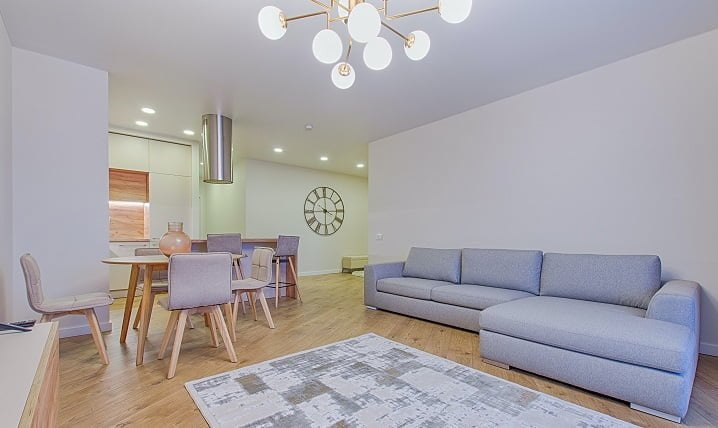
Cocaine may be a popular drug on the party scene due to its stimulating and euphoric effects, but many people are also beginning to use this substance during working hours in an attempt to be more productive and confident in the workplace.
Once cocaine’s addictive effects take hold, however, it can be extremely difficult to break. Rehab must be attended for the best chance to have a successful recovery.
What started as an occasional ‘high’ has now become a full-blown addiction, and drug and alcohol rehabs in Gloucestershire have noticed a sharp uptake in the number of people seeking treatment for cocaine addiction.
As cocaine is not physically addictive, it is generally considered safe to stop taking this substance at drug and alcohol rehab without the help of a detoxification plan.
However, it is advised that anyone making drastic changes to the amount and type of substances that they take should seek medical assistance from a drug and alcohol rehab in Gloucestershire.
Cocaine addiction is primarily psychological in nature, as this substance can cause physical changes to occur in the brain and body. These changes cannot be reversed without intensive counselling and support from a specially trained therapist at rehab in Gloucestershire.
During cocaine rehab, you will likely experience strong cravings for this substance. One of the many benefits of residential rehab is the 24/7 medical monitoring, making it impossible to give in to cravings and temptation.
Cognitive behavioural therapy (CBT) at drug and alcohol rehab is a common method used for treating cocaine addiction. It is based on the belief that our thoughts and emotions can control our actions, and that working on our minds can change our lives.
By using the techniques and strategies learned during cocaine rehab you will feel even better without this substance in your life.
To begin beating your cocaine addiction at a rehab in Gloucestershire, call us on 0800 088 66 86
Heroin Rehab In Gloucestershire & Near Gloucestershire

Woman meditating next to a lake at a residential drug and alcohol rehab clinic in Gloucestershire
If you are entering drug and alcohol rehab for heroin addiction, you know just how difficult it can be to escape from this substance.
Heroin is both physically and psychologically addictive, meaning that you will need to undergo full physical detoxification before entering into at least three weeks of intensive counselling during your stay in rehab.
Many people experience strong cravings for heroin during this time, which is why it is important to seek treatment at a drug and alcohol rehab clinic specialising in heroin addiction.
Our medical rehab staff can prescribe various medications that can help with some of the more unpleasant side effects and many people choose to switch from heroin to methadone, a less-addictive heroin substitute.
You will also have the opportunity in drug and alcohol rehab to address past traumas and experiences which may have contributed to the development of the addiction.
To begin beating your heroin addiction at a rehab in Gloucestershire, call us on 0800 088 66 86
Cannabis Rehab In Gloucestershire & Near Gloucestershire

Black and white photo of a couple sitting together at a drug and alcohol rehab in Gloucestershire
Although cannabis remains an illicit substance in the UK, many countries across the world have legalised this drug and it continues to increase in popularity across Britain. As a result, more people are seeking treatment for cannabis addiction at drug and alcohol rehab in Gloucestershire.
Cannabis is not physically addictive, but it has the potential to cause a psychological addiction that can be very difficult to break without a stay in rehab.
In the majority of cases, it is safe to stop taking cannabis without the need for a full detoxification, but it is still recommended that you do so under medical supervision at rehab in Gloucestershire.
Cannabis rehab primarily focuses on counselling, which involves developing the motivation [49] to undergo healthy lifestyle changes and replacing negative self-beliefs with a positive mindset.
Many people experience strong cravings for cannabis throughout the drug and alcohol rehab process, and these can linger for weeks and even months.
Most rehab clinics offer a twelve-month aftercare programme once you leave rehab, which can help you to build a strong support system and continue your sobriety journey.
It can also be helpful to create a relapse prevention plan with your medical team before you leave rehab, as this can help you to feel more prepared for any potential cravings or triggers.
Other types [50] of addiction that can be treated at drug and alcohol rehab in Gloucestershire include:
- Behavioural addictions (such as gambling addiction)
- Opioid use disorder (benzodiazepine/buprenorphine)
- Binge drinking
- Cannabis use disorder
- Cocaine dependence
- Codependency
- Crack cocaine addiction
- Ketamine addiction
To begin beating your cannabis addiction at a drug and alcohol rehab in Gloucestershire, call us on 0800 088 66 86
Creating A Relapse Prevention Plan At Drug & Alcohol Rehab In Gloucestershire & Near Gloucestershire

People jumping at a sunset after alcohol rehab in Gloucestershire
It’s normal to be concerned about the possibility of relapsing after treatment, particularly as it is so common – between 40% and 60% [51] of people relapse at some point after leaving a drug and alcohol rehab centre.
There is no shame in relapsing, and it doesn’t mean that you have to start again from the beginning. Instead, try to see it as an opportunity to learn from your mistakes and continue with your recovery journey.
While relapse is common, it is not inevitable. Taking the time to put together a relapse prevention plan before leaving treatment can help you feel more confident and prepared for life after drug and alcohol rehab, and help you to navigate the ups and downs of recovery.
A relapse prevention plan is a document that you will put together in the final weeks of your drug and alcohol rehab stay in Gloucestershire, with help and guidance from your counsellor and medical team.
Begin by identifying any potential triggers that may cause you to relapse after leaving drug and alcohol rehab – this could be a group of people that you spent time with, a certain route home that passes the local pub or even the time of day.
Next, focus on any lifestyle changes after drug and alcohol rehab that you can make that will limit your exposure to triggers or cravings. You may need to switch from a high-stress work environment into a role where you feel more comfortable or spend time with people who do not use drugs or alcohol.
Of course, it’s impossible to completely avoid all potential triggers for the rest of your life. As a result, your relapse prevention plan must also include proactive steps to tackle the root cause of the addiction to avoid another rehab stay.
For more advice creating a relapse prevention plan for life after rehab in Gloucestershire, call our helpful team today on 0800 088 66 86
Do I Need To Go To Alcohol Rehab In Gloucestershire Or Near Gloucestershire?
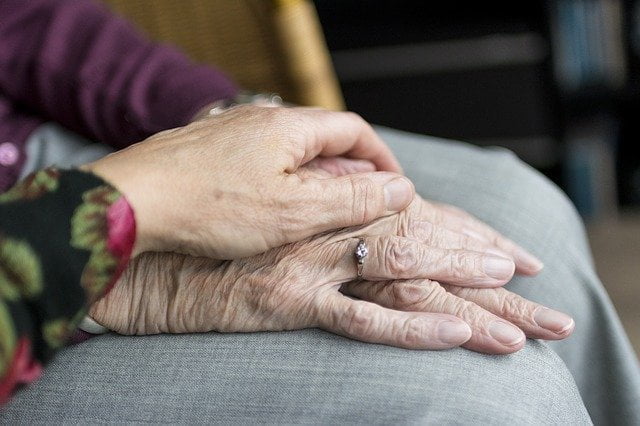
Young person and old person holding hands at a drug and alcohol rehab in Gloucestershire
Many people end up struggling with alcohol addiction, but in a society that encourages drinking so often and openly, it can be difficult to spot when it has become a problem that is big enough to warrant a stay at a drug and alcohol rehab in Gloucestershire. [52]
There are a variety of signs [53] that can indicate an alcohol problem and a need for alcohol rehab, but the following are some of the most common:
- Constantly searching for an excuse to drink or use the substance
- Hiding when or how much you drink or use a substance
- Even if you want to quit, you can’t
- Cravings
- Work or school problems
- Relationship problems
- Inability to control how often or how much you drink
- Neglecting important tasks
Professional drug and alcohol rehab treatment in Gloucestershire [56] for alcohol addiction is so vital to successful recovery, regardless of an individual’s age, [57] gender or position in life.
To learn more about spotting addiction and knowing when rehab in Gloucestershire is necessary, call us on 0800 088 66 86
Residential Drug & Alcohol Rehab In Gloucestershire & Near Gloucestershire

Woman drinking coffee and looking at the sea after alcohol rehab Gloucestershire
The success that people will have in rehab recovery can very much depend on what happens to them during the first weeks and months of their recovery.
This is when they need to be building a strong foundation and developing the skills they are going to need to stay sober long term following drug and alcohol rehab.
Most people will be able to give up alcohol or drugs in the short term when the pain of addiction is still fresh in their mind, but it is often ironically when their life begins improving that they will struggle to stay sober long after drug and alcohol rehab.
By entering an alcohol or drug rehabilitation centre the individual will be able to get the best preparation for what lies ahead of them. They will be in the best position to get the most out of recovery and to make sure that it is going to be a permanent situation.
Addiction is not considered a ‘choice’ or ‘moral failing’ on behalf of the addiction sufferer [58] – drug and alcohol rehab is about treating the disease of addiction.
For more information on what residential drug and alcohol rehab in Gloucestershire can do for you, call our team today on 0800 088 66 86
What Types of Therapy Can I Access During Drug & Alcohol Rehab In Gloucestershire?

Two people holding a sapling at a drug and alcohol rehab Gloucestershire
Therapy during drug and alcohol rehab in Gloucestershire is a major component of recovery. You will have access to a wide variety of modern and trusted therapies, which we have listed below:
1. Cognitive-Behavioural Therapy at drug rehab and alcohol rehab in Gloucestershire or near Gloucestershire
CBT is a type of talk therapy that works to help a person change recognize and then change their unhealthy or behaviours and replace them with new ones. CBT is incredibly common in substance abuse treatment at drug and alcohol rehab.
2. Contingency Management at drug rehab and alcohol rehab in Gloucestershire or near Gloucestershire
CM provides a person with rewards to motivate them to behave in a certain way or reach a certain goal (maintain sobriety.) This kind of drug and alcohol rehab treatment generally prevents dropping out and reduces relapse.
3. Motivational Interviewing at drug rehab and alcohol rehab in Gloucestershire or near Gloucestershire
MI is a type of drug and alcohol rehab treatment where a therapist guides a patient to find their own motivation for recovery and develop their own plan for success and change. This helps a person maintain a better sense of control over their treatment.
Motivational therapies are often a key part of drug and alcohol rehab recovery plans, as they help to support the self-acceptance and belief [59] that can often make the difference between sobriety and relapse.
4. Dialectal Behavioural Therapy at drug rehab and alcohol rehab in Gloucestershire or near Gloucestershire
DBT is used to reduce cravings and help patients avoid relapse after drug and alcohol rehab in Gloucestershire and learn new coping skills. Beyond substance abuse, DBT is also commonly used to treat severe personality disorders.
5. Alcoholics Anonymous and other 12-Step Programmes at drug rehab and alcohol rehab in Gloucestershire or near Gloucestershire
AA is a twelve-step support program that supports people in drug and alcohol rehab recovery by having them work through twelve specific steps and then stay sober through the support of peers who struggle with similar problems.
- Acceptance and Commitment Therapy
- Holistic/Alternative Therapies: acupuncture, art therapy, drama therapy, equine therapy, etc
- Brief Intervention
- Family Therapy
- Group Psychotherapy
- Individual Therapy
- Person-Centered Care
- Psychiatric Treatment
- Rational Emotive Behaviour Therapy
- Talking Therapies
- Eye Movement Desensitization and Reprocessing
- Motivational Interviewing/Motivational Therapy
- Contingency Management
What Are The Benefits of Private Drug & Alcohol Rehab In Gloucestershire?

Drug and alcohol support group bumping fists at a drug and alcohol rehab clinic in Gloucestershire
Statistics show that those who attend residential or inpatient treatment have a 70% chance of successful recovery compared to those who attend outpatient drug and alcohol rehab or recovery in the community.
This is because private drug and alcohol rehab offers an unparalleled setting, free of triggers and stressors, where the individual can entirely focus on their recovery.
Private rehab in Gloucestershire is the perfect environment to recover in due to the unlimited support on-hand. Peer support via group therapy can be accessed daily, from people who understand your situation and can empathise.
We also have highly trained counsellors and psychotherapists in attendance who can discuss any aspects of your mental health and rehab recovery with you.
Finally, our staff, housekeepers, and even chefs all understand the components of a successful recovery. This is why we provide a fully nutritional meal plan at drug and alcohol rehab to help the body recover from drugs or alcohol, ensuring all meals provided are rich in vitamins and minerals.
- 24/7 supervision
- Medically-assisted drug and alcohol detox
- On-hand medical staff as well as drug and alcohol rehab experts
- Full nutritional support
- Access to specialist drug and alcohol rehab facilities including gym, leisure and grounds
- Alternative drug and alcohol rehab therapies
- Private accommodation on-site at drug and alcohol rehab in Gloucestershire
- Visitor friendly
- Safe and trigger-free drug and alcohol rehab setting
- 12-Step programmes
- Group drug and alcohol rehab therapy
- Access to private drug and alcohol rehab counsellors
- Psychiatric assessments
- Communication with your GP
- Holistic drug and alcohol rehab therapy
- Aftercare plan to keep you sober after your time at drug and alcohol rehab has concluded
Call our helpful, friendly team today on 0800 088 66 86
Benefits of Medical Detox During Drug & Alcohol Rehab In Gloucestershire

Couple holding each other in a field following alcohol treatment at a drug and alcohol rehab Gloucestershire
Many people wrongly assume that recovery can be completed alone or at home, simply by stopping the substance or quitting drinking. But this stage is what is known as ‘detox’, and can be extremely dangerous if attempted without medical support at drug and alcohol rehab.
Detox means eliminating all toxic substances from the body, to enable the body and mind to progress to the next stage of recovery (rehabilitation.) But when the body has become dependent on drugs or alcohol, especially after prolonged use, sudden withdrawal can cause unpleasant complications.
When the substance is suddenly removed, and not weaned off or replaced with substitute medication, the body can go into shock which can cause health risks, even fatal ones.
Detox and the withdrawal symptoms that come along with detox can be dangerous.
When someone goes through medical detox at drug and alcohol rehab in Gloucestershire, a team of doctors and medical professionals monitor them.
They are then able to provide them with medication that can make the process less dangerous and keep them safe. In fact, medical detox is the only way for someone to detox and start recovery safely.
The benefits of a medically-assisted detox at drug and alcohol rehab include unlimited access to medical care, medication, and 24-hour supervision if an emergency arises. Our physicians will be able to explain the process to you and help you understand what your body is going through.
Understanding the Length of Drug & Alcohol Rehab In Gloucestershire

Couple sat together after treatment at a drug and alcohol rehab in Gloucestershire
How long a person has to stay a drug and alcohol rehab depends on a number of different things.
Because drug and alcohol rehab tends to be goal-based rather than time-based, each patient is different. Your rehabilitation schedule will be given to you during the admission phase, once our addiction specialists have devised your treatment plan.
Throughout your stay in rehab in Gloucestershire, you will be assessed and reviewed.
Normally, we do not encourage patients to leave drug and alcohol rehab early, but it is common for certain individuals to stay longer than intended simply to get more out of their spiritual and health-related journey.
Whilst full recovery can take anywhere from six months to five years, [60] full-time drug and alcohol rehab treatment will rarely last this long.
There are four main time frames that drug and alcohol rehab typically takes – 30 days, 60 days, 90 days, or extended stay programmes like halfway houses.
Drug and alcohol rehab doesn’t end once you leave oyur facility though, which we have discussed in our aftercare section below.
Options For Aftercare After Drug & Alcohol Rehab In Gloucestershire
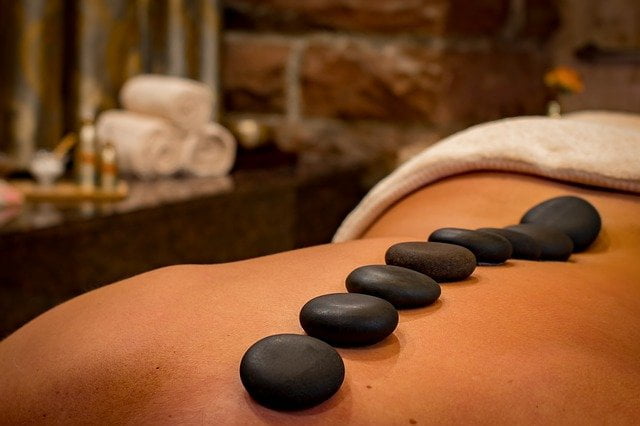
Person receiving a hot stone massage during holistic therapy at a drug and alcohol rehab clinic in Gloucestershire
The options that people will have for aftercare once they leave drug and alcohol rehab will include:
- The individual may decide to go on to a halfway drug and alcohol rehab. This is another facility (or sometimes the same facility) where they will remain as a resident for up to two years. The individual will still have group therapy sessions and other interventions in this type of drug and alcohol rehab, but they will have far more freedom than in a normal facility. These halfway drug and alcohol rehab centres are often referred to as dry houses, and the individual will only be allowed to stay there if they remain sober and follow the program.
- The person can also decide to continue therapy sessions as a drug and alcohol rehab outpatient. This could include group therapy or one-to-one therapy.
- One of the most effective options for drug and alcohol rehab aftercare is the 12-step group. These meetings are free to attend (they accept donations), and they offer the individual a social support network of sober friends. The real advantage of choosing this option is that these groups not only provide the individual with a means to stay sober but also provide a program for living. They follow religion and the concept of a higher power.
Call our helpful, friendly team today on 0800 088 66 86
What Are The Alternatives To Drug & Alcohol Rehab In Gloucestershire Or Near Gloucestershire?

Outdoor photo of a drug and alcohol rehab in Gloucestershire
If you are unable to find a drug and alcohol rehab clinic in Gloucestershire that suits your budget and lifestyle or simply wish to explore alternative options, there are a range of other treatment methods available across Gloucestershire[23] that can be highly effective at treating and managing substance use disorders.
12-Step Programmes in Gloucestershire or near Gloucestershire
If you live in Gloucestershire, chances are that you are in close proximity to a regular Alcoholics Anonymous or Narcotics Anonymous meeting.
These free, local 12-Step programmes provide a safe and non-judgmental environment in which people dealing with drug or alcohol addictions can meet regularly and provide support and advice to each other.
Many people self-medicate with substances due to feelings of loneliness or isolation, so the close friendships and community formed by these groups can be extremely effective at helping you to become and remain sober.
Both AA and NA host multiple, frequent meetings in and around the Gloucestershire area.
Outpatient Drug Rehab & Alcohol Rehab Programmes in Gloucestershire or near Gloucestershire
Many people with addictions can still hold down jobs and manage families, and these responsibilities can be difficult to juggle alongside a stay at a residential drug and alcohol rehab clinic in Gloucestershire.
Thankfully, many clinics offer outpatient drug and alcohol rehab programmes that patients can attend on a part-time basis, allowing them to continue attending work and looking after their families.
These programmes include medically-managed detoxification, prescribed medications and intensive counselling sessions as well as support and guidance in relapse prevention. They have been credited with making addiction recovery and rehab accessible and affordable for many people.
Outpatient services are a fantastic way to receive addiction treatment in Gloucestershire without putting your entire life on pause.
Home Detox in Gloucestershire or near Gloucestershire
If your addiction is mild to moderate, you may qualify to undergo detox in the comfortable and familiar surroundings of your own home.
Home detox is the most affordable method of recovery and involves undergoing the detoxification and withdrawal process at home instead of at a drug and alcohol rehab clinic in Gloucestershire.
This is different from a completely unsupervised detox, which is something that no addiction sufferer should do. [24]
Home detox can still be dangerous, so you will need to meet specific criteria before you are approved for this method of treatment.
A doctor will assess you over a telephone call or video chat beforehand, and prescribe any necessary medications. They will also check in on you throughout the process and provide access to a 24/7 helpline in case of an emergency.
Thanks to its remote nature, most people looking for addiction treatment in Gloucestershire who qualify for home detox can access it.
SMART Recovery in Gloucestershire or near Gloucestershire
Similar to other local support groups, SMART Recovery is a self-empowering support group for people struggling with alcohol or drug addiction.
Self Management And Recovery Training (SMART) [25] teaches the tools and techniques required to manage cravings, avoid triggers and make healthier decisions.
You will learn how to show self-compassion, set realistic and achievable recovery goals and replace negative, self-destructive thoughts with positive and healthy ones. Many people have found success through SMART Recovery and have gone on to live fulfilling and balanced lives, particularly when combined with other methods such as counselling.
SMART Recovery hosts several meetings throughout Gloucestershire, as well as many frequent online meetings.
Drug & Alcohol Addiction Counselling in Gloucestershire or near Gloucestershire
Many people keep their emotions bottled up inside, and this can lead to them self-medicating with drugs or alcohol in an attempt to manage these feelings.
Others may have never learned to cope with upsetting or uncomfortable emotions healthily, reaching instead for substances when they are struggling.
Counselling can be a safe space in which you can talk freely about your past experiences and current emotions. Using techniques such as Cognitive Behavioural Therapy (CBT) your therapist can help you to learn and develop healthy coping skills to live a life free from addiction.
CBT in particular is very effective at treating addiction [26], with a relatively low relapse rate [27] for most people who complete a full course, although some individuals will find it less effective. [28]
Counselling is a very popular choice for those looking for addiction treatment in Gloucestershire.
Al-Anon Meetings After Drug Rehab & Alcohol Rehab in Gloucestershire or near Gloucestershire
Even if you don’t suffer from a substance use disorder yourself, you may still require help and support if you have a friend or family member who is dealing with an addiction.
Al-Anon meetings are located throughout Gloucestershire and can help you to connect with other people who may share similar experiences.
These free meetings allow friends and family members of addicted individuals to come together and provide advice and support, listening to and advising each other throughout this difficult time.
Several al-anon family meetings are held regularly throughout Gloucestershire.
To learn more about the alternatives to rehab in Gloucestershire, call our team on 0800 088 66 86
>Charities & Statutory-Funded Drug & Alcohol Rehab Services In Gloucestershire

Alcohol addiction therapy group taking notes together at a drug and alcohol rehab centre in Gloucestershire
1. Change Grow Live near Gloucestershire
Address: 41-43, Imperial Chambers, Longsmith St, Gloucester GL1 2HT
Telephone: 01452 223 014
Website: https://www.changegrowlive.org/drug-alcohol-recovery-service-gloucestershire/gloucester
2. The Nelson Trust Women’s Centre, near Gloucestershire
Address: 1 Brunswick Square, Gloucester GL1 1UG
Telephone: 01452 397 690
Website: https://nelsontrust.com/how-we-help/womens-community-services/
3. Young Gloucestershire
Address: Dock Office, The, Commercial Rd, Gloucester GL1 2EB
Telephone: 01452 501 008
Website: https://www.youngglos.org.uk/what-we-do/wellbeing/addiction/
Contact 12-Step programmes in Exeter such as Cocaine Anonymous, Narcotics Anonymous (NA) and Alcoholics Anonymous (AA) for help maintaining your sobriety.
Here, you can increase your chances of having a smooth and successful journey, by connecting with other people in recovery.
The NHS provides reliable and free information about drugs and alcohol, as well as information about addiction.
SMART Recovery will help you to manage any relapse triggers, and provide you with plenty of tools and coping mechanisms as you navigate your new life of sobriety.
Al-Anon are another vital service open to you and to your friends and family.
Access free mental health support by contacting Rethink Mental Illness, Mind, Young Minds, Samaritans and Papyrus.
Other places you can reach out to include Alateen, Change Grow Live, Turning Point, We Are With You, National Association for Children of Alcoholics, National Institute for Health and Care Excellence, and the NHS Foundation Trust.
Access Drug Rehab & Alcohol Rehab In Gloucestershire Today With Rehab Recovery

Person typing on a phone at a drug and alcohol rehab in Gloucestershire
The services Rehab Recovery can offer are available across Cirencester, Stroud, Chipping Campden, Cheltenham, Wotton-under-Edge, Bourton-on-the-Water, Nailsworth, Berkeley, Tetbury, Stow-on-the-Wold, Fairford, Painswick, Bibury, Tewkesbury, Winchcombe, Lechlade-on-Thames, Moreton-in-Marsh, Ampney Crucis, Blockley, Chalford, Northleach, Bledington, Cinderford, Bisley, Dursley, Broad Campden, Bishops Cleeve, Coleford, Ashleworth, Arlingham, Chedworth, Birdlip, Mitcheldean, Alderton, Bourton-on-the-Hill, Kemble, Batsford, Newent, Adlestrop, Alderley, Lydney, Stonehouse, Bagendon, Andoversford, Broadwell, Frampton on Severn, Alkington, Icomb, Didbrook, Minchinhampton, and even more towns in and around Gloucestershire.
All of the drug and alcohol rehab centres we recommend in Gloucestershire and across the UK are regulated by the Care Quality Commission (England and Wales) or the Care Inspectorate (Scotland).
At Rehab Recovery, we offer free advice from a team of non-judgemental professionals, many of whom are in recovery and understand how hard it can be to change your relationship with addiction.
For more information about drug and alcohol rehab in Gloucestershire, reach out to our 24/7, confidential hotline on 0800 088 66 86.
References for Drug & Alcohol Rehab in Gloucestershire
[1] https://nida.nih.gov/publications/drugs-brains-behavior-science-addiction/drug-misuse-addiction
[2] https://www.apa.org/topics/substance-use-abuse-addiction/alcohol-disorders
[3] https://www.mountsinai.org/health-library/selfcare-instructions/deciding-to-quit-drinking-alcohol
[4] https://nida.nih.gov/research-topics/recovery
[5] https://www.gloucestershirelive.co.uk/news/alcohol-deaths-hit-record-high-6319531
[7] https://www.ncbi.nlm.nih.gov/pmc/articles/PMC4402015/
[8] https://www.ncbi.nlm.nih.gov/pmc/articles/PMC4553654/
[9] https://www.ncbi.nlm.nih.gov/pmc/articles/PMC3047254/
[11] https://www.ncbi.nlm.nih.gov/pmc/articles/PMC6876494/
[12] https://www.niaaa.nih.gov/publications/brochures-and-fact-sheets/understanding-alcohol-use-disorder
[13] https://pubs.niaaa.nih.gov/publications/aa63/aa63.htm
[14] https://www.ncbi.nlm.nih.gov/pmc/articles/PMC6241194/
[16] https://www.health.harvard.edu/staying-healthy/11-ways-to-curb-your-drinking
[17] https://www.ncbi.nlm.nih.gov/pmc/articles/PMC3052346/
[18] https://scholar.google.com/citations?hl=en&user=VHMpXXIAAAAJ
[19] https://nida.nih.gov/publications/drugs-brains-behavior-science-addiction/treatment-recovery
[20] https://scholar.google.com/citations?hl=en&user=Ptx0xPkAAAAJ
[25] https://smartrecovery.org.uk/about-smart-recovery-meetings/
[26] https://gpsych.bmj.com/content/32/5/e100087
[27] https://pubmed.ncbi.nlm.nih.gov/32954958/
[28] https://www.ncbi.nlm.nih.gov/pmc/articles/PMC7001356/
[29] https://www.asam.org/asam-criteria
[30] https://www.mdcalc.com/calc/1729/cage-questions-alcohol-use
[31] https://www.ncbi.nlm.nih.gov/books/NBK92053/table/ch2.t5/?report=objectonly
[33] https://www.niaaa.nih.gov/alcohol-health/overview-alcohol-consumption/moderate-binge-drinking
[34] https://www.nhs.uk/live-well/alcohol-advice/the-risks-of-drinking-too-much/
[35] https://www.ahrq.gov/prevention/guidelines/tobacco/5steps.html
[36] https://www.verywellmind.com/the-craft-approach-to-substance-abuse-intervention-5191125
[38] https://effectivehealthcare.ahrq.gov/products/alcohol-misuse-drug-therapy/consumer
[39] https://www.aafp.org/pubs/afp/issues/2016/0315/p457.html
[40] https://agapetc.com/what-is-the-best-antidepressant-for-an-alcoholic/
[41] https://www.ncbi.nlm.nih.gov/pmc/articles/PMC5614930/
[42] https://premierneurologycenter.com/blog/neurologic-diseases-associated-with-alcohol-consumption/
[43] https://www.niaaa.nih.gov/publications/alcohol-and-brain-overview
[44] https://www.ncbi.nlm.nih.gov/pmc/articles/PMC3321494/
[45] https://www.cdc.gov/alcohol/fact-sheets/womens-health.htm
[46] https://pubs.niaaa.nih.gov/publications/aa22.htm
[47] https://www.niaaa.nih.gov/alcohols-effects-health/alcohols-effects-body
[49] https://www.ncbi.nlm.nih.gov/pmc/articles/PMC6760428/
[50] https://www.ncbi.nlm.nih.gov/pmc/articles/PMC5328289/
[51] https://www.newdirectionsforwomen.org/what-percentage-of-alcoholics-recover/
[53] https://www.ihs.gov/asap/familyfriends/warningsignsdrug/
[54/55] https://www.ncbi.nlm.nih.gov/pmc/articles/PMC6876531/
[57] https://www.niaaa.nih.gov/alcohols-effects-health/alcohol-topics/older-adults
[58] https://scholar.google.co.uk/citations?hl=en&user=4iN7MOMAAAAJ
[60] https://www.racnj.com/the-five-stages-of-addiction-recovery/


